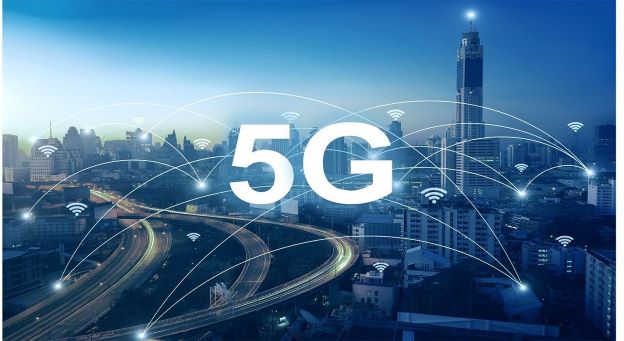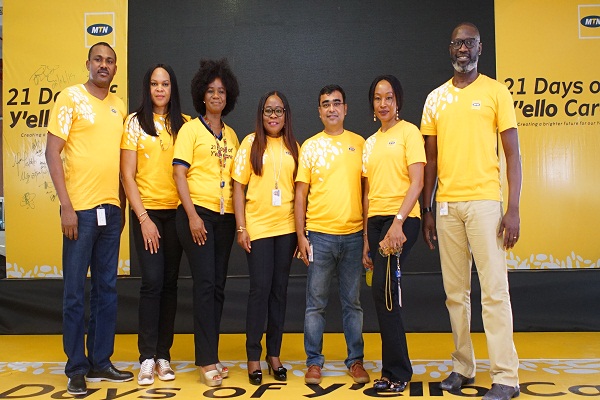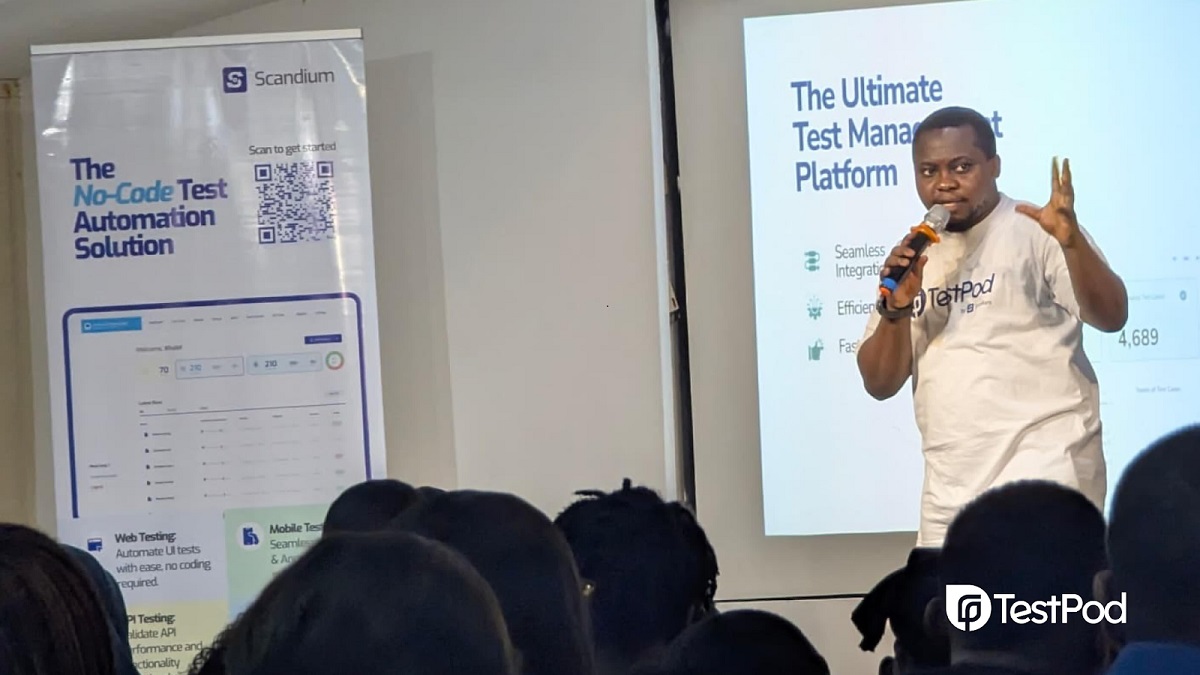Telecom
FG Generates $547M from 5G Spectrum Auction

President Muhammadu Buhari has commended the auctioning of the 5G spectrum, which generated 547 million dollars. The president attributed the feat to the digital economy, which had driven growth, created employment and generated revenue for the country.

The president said this at the National Shared Services Centre, a one-stop-shop for Ministries, Departments and Agencies to (MDAs) interface with citizens, which also houses a Cyber Security Operations Centre, Network Centre and Call Centre in Abuja on Tuesday.
According to the president, the National Shared Services Centre will provide services that are “swift, secure and seamless’’. Buhari noted that the Information, Communication and Technology Sector (ICT) had accelerated diversification of the economy.
He said the Q2 Gross Domestic Product Report by the National Bureau of Statistics showed the extent of growth, with the ICT contributing an unprecedented 18.44 per cent to the GDP, close to three times the 6.33 per cent contribution of the oil sector in the same quarter.
“As part of our efforts to expand our digital infrastructure; we increased our 4G base stations from 13,823 to 36,751 from August 2019 to date, and this has increased the percentage of 4G coverage across the country from 23 per cent to 77.52 per cent also from August 2019 to date.
”We have also followed this up with roll-out of 5G services. It is noteworthy that the digital economy sector has excelled in generating revenue for the government.
”In particular, at the Ministerial Retreat that I chaired from the Oct. 18 to Oct. 19, 2022, our independent analysts adjudged the digital economy sector to have generated 594 per cent of its revenue target from the 2019 baseline”This is very commendable. As part of these unprecedented achievements, the sector generated over 547 million dollars from the auctioning of the 5G spectrum alone,’’ he said.
Buhari said he was pleased to unveil and commission a number of initiatives that further express the government’s commitment to develop a sustainable digital economy in Nigeria.
“These initiatives are part of our administration’s efforts to position the digital economy as a key enabler for the diversification of our economy and as a catalyst for the transformation of every sector of our economy.
“You will recall that I unveiled and launched the National Digital Economy Policy and Strategy for a Digital Nigeria on the 28th of November, 2019 and I am very proud of the giant strides and the unprecedented progress that we have made in in less than one year since the unveiling.
“To ensure that the digital economy sector remains successful and in order to reduce the burden on citizens, I recently approved the suspension of the proposed excise duty in the telecoms sector, as any initiative that will lead to hardship for the citizens would not be pursued,’’ the president said.
Buhari said the digital economy ensured continuity in governance during the restrictions that came into force as a result of the COVID-19 pandemic.
“We approved the National Policy on Virtual Engagements for Federal Public Institutions on the Oct. 14, 2020 and this enabled us to formalise government online meetings.
”As such statutory meetings like the Federal Executive Council meetings, Council of State meetings and other meetings can now take place online, effectively and legally.
“Our administration’s commitment to promoting data promotion and privacy is receiving praise across the world and we have increased our digital identity enrolments from 39 million in October 2020 to about 92 million today.
“The massive increase of about 63 million in about two years is a global success story and has led to several requests for partnership from countries within and outside Africa.
”I also approved the establishment of the Nigeria Data Protection Bureau on the Feb. 14, to provide an institutional framework for data protection in Nigeria, in line with global best practices,” the president told the gathering of ICT experts and government officials.
He said a number of policies and programmes to enhance the productivity of the digital economy sector had been developed.
According to him, the National Policy on NIN-SIM integration has enhanced the integrity of the National Identification Number database.
”Similarly, the Nigerian Postal Service has been repositioned through the unbundling of its services to increase its efficiency and make it more viable as a revenue generating agency of government.
”The two subsidiaries are the Property & Development Company and the Transport & Logistics Company.
“As part of the NDEPS, I approved the Oct. 24 as the Digital Nigeria Day. I am delighted that the maiden Digital Nigeria International Conference and Exhibitions commenced on the 24th of October 2022.
”I am confident that the outcome of the conference as noted in the communiqué will support the growth of the digital economy sector. I signed the Nigeria Start-up Bill into law on the Oct. 19 2022,” he said.
According to him, the Nigeria Start-up Act is a landmark legislation of this administration to transform the pool of highly talented youth in the country into a pool of highly innovative digital entrepreneurs.
”We aim to make Nigeria a global hub for digital talent. It was an executive bill that was initiated by the Honourable Minister of Communications and Digital Economy,” he added.
Buhari also noted partnerships with leading global ICT companies to train Nigerians in cutting edge and high demand digital skills.
“This includes the training of five million Nigerians as part of a partnership with Microsoft Corporation.
”It also includes the training of an additional one million Nigerians in skills in areas such as block chain technologies, cyber security and data analytics, among others,” he stated.
Buhari commended the giant strides made by the digital economy sector under the Minister of Communications and Digital Economy and other stakeholders, describing it as impressive.
In his remarks, Minister of Communication and Digital Economy, Isa Ali Pantami appreciated the President for his support for the digital economy.
He noted that the economy had witnessed turnovers in broadband/Internet penetration, skills acquisition for global competitiveness and infrastructure development, like the fiber optic cable, which was about 15,000kms in 2015, and increased to more than 60,000kms.
Pantami said there had been 2,255 interventions and programmes in the higher institutions of learning, secondary schools, and some private schools, and the quarterly revenue from ICT rose from N51 billion to N418 billion.
He added that some prominent institutions like the Massachusetts Institute of Technology, U.S., had shown interest in researching the pace of growth in the sector.
The minister listed many policy interventions that had directly impacted on governance, institutions, markets and citizens, assuring that the ICT would enhance the process of diversifying the economy.
Prof. Muhammed Abubakar, the Managing Director/Chief Executive Officer of the Galaxy Backbone, said 400 MDAs Agencies were already connected to the National Shared Services Centre.
At the close of the event, two young Nigerians, Kalim Haruna, who developed a system called “Sharp-Sharp’’ and Bashir Abubakar, founder of “Africa First’’, were honoured by the president for their creativity and ingenuity, and showcasing the nation’s talent in a global ICT conference.
Telecom
MTN Plans Second Public Offer in Nigeria

Ralph Mupita, president,MTN Group, has announced plans to reduce its shareholding in MTN Nigeria through a public offer after it returns to profitability.

The group aims to cut its stake from 76 percent to 65 percent in line with its longstanding commitment to deepen local ownership, according to ITWeb, South African tech publication.
Mupita, who disclosed the plan during an editors’ roundtable meeting this week, said “The only localisation we have as MTN Group is we have potentially a sell-down in Nigeria at some point in time, approximately 11 percent. This is something we have said long ago, that over time, we would want more Nigerians owning the company, and we are prepared to sell down to 65 percent. We are at around 76 percent,” he said.
The anticipated offer would mark MTN’s second major retail public offering in Nigeria, following its 2021 sale of 575 million MTN Nigeria shares to local investors.
That offer was oversubscribed, resulting in the allocation of 661.25 million shares, including a 15 percent greenshoe option. This reduced MTN’s stake in its Nigerian unit to 75.6 percent from 78.8 percent.
More than 126,000 investors participated in that round, including retail and institutional investors such as Nigerian pension funds, representing approximately 6.5 million contributors.
At the time in 2022, MTN Group announced plans to further reduce its stake to approximately 65 percent from 75.6 percent.
Mupita confirmed that the Group would only proceed with a new offer once MTN Nigeria resolves its negative equity position and resumes dividend payments.
Currently, MTN Nigeria’s shares are trading at N235 per share.
Despite reporting a revenue of N3.36 trillion in 2024, a 36.03 percent bump from N2.47 trillion in 2023, it posted a loss after tax of N400.44 billion, a 192.25 percent rise from N137.02 billion in 2023.,
This negative performance was driven by macroeconomic headwinds, including record inflation and a steep devaluation of the naira, which raised operating costs and wiped out investor value.
MTN Nigeria has fallen behind MTN South Africa as MTN Group’s largest revenue contributor.
However, the Group is projecting a rebound in 2025, citing key drivers such as recent tariff adjustments, operational restructuring, and improving macroeconomic indicators in Nigeria.
Speaking at the roundtable, Mupita highlighted that the Group is anticipating a V-shaped recovery in Nigeria’s service revenue. He pointed to the recent structural reforms, such as the removal of fuel subsidies, the naira stabilisation, and improved dollar availability.
“The continued normalisation of these factors, particularly naira stability, should have positive impacts on consumer spending power and our business operations,” Mupita noted in the Group’s financial statement for 2024 recently.
Telecom
MTN Staff Commission New Set of Classrooms at Iwerekun Community High School

In a remarkable demonstration of corporate volunteerism, MTN staff, through the Y’ello Care initiative, have renovated a school block at Iwerekun Community Senior High School, Lakowe. This effort has restored hope and significantly improved learning conditions for both students and teachers.

The project, led by dedicated MTN employees, is part of the annual Y’ello Care campaign, which focuses on empowering communities through education, digital inclusion, and economic support.
Prior to the renovation, students at Iwerekun Community Senior High School faced challenges, including deteriorating classrooms that hindered effective learning. Recognising the need for intervention, MTN staff stepped in to transform the learning space, creating a safe, conducive, and inspiring environment for both students and teachers.
At the commissioning ceremony, Honourable Jamiu Tolani Alli-Balogun, Commissioner of the Lagos State Ministry of Basic and Secondary Education, acknowledged the significance of MTN’s contribution to education: “The education sector worldwide thrives on collaboration and commitment between public and private partners. MTN’s generous contribution is truly recognised, and I express my deepest gratitude for its unwavering commitment to supporting education in Lagos State. This new facility will provide a conducive environment for teaching and learning, enabling our students to reach their full potential.”
Representing the Ojomu of Lakowe, Prince Mukaila Adeola expressed the community’s gratitude: “This is a rare opportunity, and it is not every day that Lakowe benefits from such support. We truly appreciate MTN for this contribution, and we look forward to even more support in the future.”
The renovated school block is equipped with improved water supply and an inverter included in a serene environment that enhances the learning experience. This renovation will ensure that students and teachers have a more comfortable and sustainable academic setting.
Speaking on the significance of the project, Tobe Okigbo, Chief Corporate Services and Sustainability Officer (CCSSO) at MTN Nigeria, emphasised the personal investment of MTN staff: “I want to emphasise that this commissioning was made possible by the dedicated staff of MTN. Although MTN has a Foundation funded by 1% of the company’s annual profits, the credit for this commissioning goes to the MTN Nigeria staff members who, through their personal contributions, made this happen.”
Beyond the fresh coat of paint and structural improvements, initiatives like this create a lasting impact and a sense of hope in the lives of the students. The addition of a reliable power source and water facility means that students no longer have to struggle with poor infrastructure, allowing them to focus on their education.
For many students, access to quality education remains a challenge—not just because of financial barriers but also due to poor infrastructure, lack of resources, and limited teacher support. Programmes like Y’ello Care, alongside other education-focused volunteer initiatives, are helping to fill these gaps by creating safe, well-equipped learning environments and equipping students with knowledge beyond the classroom.
With the successful completion of the Lakowe school project, MTN reaffirms its commitment to education and youth development. The company encourages more organisations to embrace volunteerism and community service, as collective action remains a powerful force for societal progress.
Telecom
Scandium Introduces TestPod to Revolutionize Software Testing Across Africa and Beyond

Today’s software ecosystem is moving fast, building quality digital products has never been more crucial and more complex. As teams accelerate release cycles using a blend of manual and automated testing, one persistent issue remains: test management is fragmented.

That’s the problem TestPod, a newly launched test management platform from the team behind Scandium, is built to solve.
TestPod officially launched on Friday, April 11, 2025, offering software teams (whether in Africa or anywhere else) a much-needed solution to centralize and track their testing processes across platforms and test types. Whether it’s manual, automated, exploratory, accessibility, performance, or regression testing, TestPod brings visibility, structure, and speed to fragmented QA workflows.
“We spoke to over 200 teams at different African startups and enterprises, and despite having some automation in place, at least 90% are still heavily reliant on manual testing, just like their global counterparts,” said AbdulAzeez Ogunjobi, CEO and Co-Founder of Scandium Systems.
He explains that while Scandium’s AI-powered no-code automation suite is already being used across web, mobile, and API products globally, TestPod addresses a more foundational gap: organizing and managing all forms of testing—not just automation.
“Furthering our mission to help teams build bug-free digital products, we’re launching TestPod to help them organize their software testing operations, regardless of what kind of testing they need to do,” he added.
The timing is critical. According to the World Quality Report 2024–25, 68% of organizations are exploring Generative AI in their QA workflows, but most still lack clarity on what tests are running, what’s failing, and how test coverage aligns with ongoing releases.
Meanwhile, Africa’s digital economy is booming. A recent McKinsey report estimates it could contribute over $712 billion to continental GDP by 2025. The continent now holds more than 1.1 billion registered mobile money accounts, and in 2023 alone, over $1 trillion in transactions were processed across Instant Payment Systems, according to AfricaNenda. Regulations are tightening. Quality, reliability, and user trust are becoming more central, as the continent churns out more tech solutions in expanding sectors.
Testing isn’t just about automation. It’s about knowing what’s working and what’s broken.” noted Sodeeq Elusoji, CTO and Co-Founder of Scandium. “The real bottleneck in testing isn’t always a lack of automation—it’s lack of visibility. You can’t improve what you can’t track, and that’s what TestPod delivers.”
Unlike traditional tools that prioritize rigid workflows, TestPod is lightweight, modern, and flexible, designed for agile teams who need to move fast. It supports test case authoring, tagging, execution tracking, and real-time dashboards.
“Testing has evolved, but the way teams manage tests hasn’t caught up. We’ve seen teams with advanced automation pipelines still tracking test outcomes in spreadsheets and Slack.” said Jafar Alabi, Vice President of Products and Business Development at Scandium.
While it integrates seamlessly with Scandium’s no-code test automation suite, TestPod is framework-agnostic, making it a perfect fit for teams using Selenium, Playwright, Cypress or other custom test stacks.
Backed by a proven team with success building Africa’s first no-code test automation platform, Scandium has already achieved 6-figure ARR and powers test automation across 120+ organizations in 15+ countries. With TestPod, they’re expanding that impact even further—from test execution to test orchestration.
TestPod is now available at testpod.io. Early access is open globally and free for teams of all sizes.
As Africa’s tech scene continues to accelerate—with fintech, health tech, and mobility leading the charge, TestPod is built to ensure these innovations are not just fast but flawless.

 General News2 days ago
General News2 days agoAFD Commits €3m to Africa’s Financial Inclusion

 E-Financial2 days ago
E-Financial2 days agoVerve Expands Payment Frontiers with Global Partnerships, Contactless Innovation

 General News2 days ago
General News2 days agoEU Aims to Remove Barriers to AI Development

 News2 days ago
News2 days agoFG Inaugurates Board of Galaxy Backbone

 E-Business2 days ago
E-Business2 days agoAfrica Plans to Establish a $60Bn AI Fund

 E-Business1 day ago
E-Business1 day agoCyberattacks: ‘56 Percent of Cases Stem from Existing Logins

 News2 days ago
News2 days agoST Team Partners with Deji of Akure to Boost Agriculture and Food Security in Ondo State

 Telecom2 days ago
Telecom2 days agoBolt’s Playtivism Campaign Brings Chess Park to Lagos






















